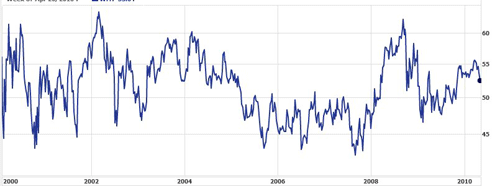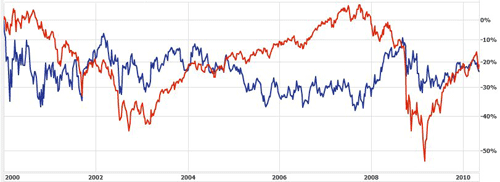When the market is choppy, trendless, or hard to define, what sort of stocks should you own as an investor? For many the answer is defensive stocks. What are defensive stocks and how do they help one during difficult economic times?
Definition of a Defensive Stock
Defensive stocks are those you want to own during tough markets. They go up somewhat in good times and go down a little in bad times. Or they may even go up in bad and down in good! These are stable stocks that do not see volatile swings from supply and demand.
For example, many people see Walmart as a defensive stock (equivalent in Australia ASX, Wesfarmers WES, Coles and Woolsworth WOW ). As can be seen below on the 10 year price chart, this is not a stock owned for its high price appreciation over time. The price has traded between 45 and 60 dollars over the past decade.

A defensive stock, as you may have guessed, does not have a strong correlation to the overall market. Just compare Walmart to the S&P500 index from North America.

The blue line is Walmart and the red line is the S&P500 index. It would appear that there is even a negative or inverse correlation between the market and this defensive stock. As prices fell 50 percent in 2008, Walmart actually went up in value substantially. This relationship between the stock and market is called beta. If you screen for stocks with a beta of less than one, you will come up with a potential list of shares that are defensive and do not react in the same fashion as the market.
Defensive stocks are also not necessarily value stocks and definitely not growth stocks. They usually have fairly low ‘price to earnings ratios’ since the stocks are not wild momentum picks.
Slower moving stocks have lower P/E ratios.
Why Invest in Defensive Stocks?
With little capital appreciation potential, why would someone invest in defensive stocks? Wouldn’t it be better to just put our money in the bank for interest?
The rationale behind defensive stocks is to gain a dividend that should beat interest rates. For example, while the United States is cutting interest rates back to virtually nothing in the hopes of stimulating the economy, Walmart continues to give a two percent dividend with the potential of a small appreciation in share price as the economy further declines. Keep in mind that some investors must stay invested, such as fund managers, so they would obviously turn to the safest investments possible during turbulent times.
Eat, Drink, and Smoke Your Defensive Stock
What are examples of defensive stocks? Think about what people continue to do despite bad economic times. People still eat, drink, and smoke. Granted, they may change where or what they eat, drink, and smoke, but these habits are usually not thrown aside in bad times.
For instance, smokers might turn from high priced cigars to a more economical choice, but rarely will they give it up altogether to save a few dollars. Some may even smoke more to deal with the stress. Likewise, people still need to eat. High price restaurants may suffer but discount grocers may see more people flocking to their pens as they try to reduce food budgets. People will continue to buy pop, water, and other basic products.
TIP: Stick close to the food, drink, and tobacco manufactures for a defensive stock pick
Generic Drugs Make Good Defensive Plays
It used to be that a smart pharmaceutical company with cutting edge research could dominate the market in good times and bad making a good defensive stock. These days are gone. Why?
Generic drug companies are able to swoop in and develop the drug in question after a very short period of time. The patent or exclusive producing rights are very short lived these days. Add to that, many generic companies will thumb their nose at the regulations and produce the drug early anyways. This is equivalent to stealing and selling classified trade secrets. But if the branded drug company wishes to take them to court, and much of the time they do not, the damage is already done by the time a ruling is passed. The generic drug companies have now become an excellent defensive play in the market.
Real Estate and Utilities
As with other defensive stocks and sectors much caution is needed. Buying into a stock that builds new homes would be a financial disaster during an economic crisis. So could buying into telecommunications since the competition is aggressive.
On the other hand, purchasing a Real Estate Investment Trust based on low to moderate income housing such as apartment dwellings is a defensive strategy. While many businesses may close and high end housing may drop, the lower end accommodations may even see a rise in occupancy rates.
As well, people need to heat their home with either electricity of natural gas. Cable is usually the last feature to be cut. In certain markets there will be fewer choices for consumers creating a monopoly for the provider. While the people using their service may wish for more options, the buyer of such a stock is no doubt happy with the stability of share price and a decent dividend payout.
Defensive Stock Funds
There are other ways to get defensive in a bad market. You might find the task of actual stock selection quite daunting. In this case you can purchase ETF’s or other managed funds that will do the picking for you.
Picking a defensive fund will give you broad exposure to a sector or industry group that should remain fairly stable during an economic crisis. As well if your fund is actively managed by a shrewd manager, he is no doubt doing the work of selling cyclical stocks and replacing them with defensive stocks as the markets turn.
Adding Defensive Stocks to a Portfolio
So how should we use the defensive stock strategy? If you are an extremely conservative investor afraid of the markets you can continually stay invested in these stocks. The downside is very low capital appreciation or growth compared to cyclical stocks during the booming bull market.
Others will track market sentiment and convert their shares to defensive stocks that are based in groceries, tobacco, generic drug companies, and apartment building REIT’s to protect their portfolio during choppy or bear markets. Still others will simply liquidate during bear markets and take a lower risk lower payout that the banks offer in interest rates. Regardless of the choice you make, being aware of defensive stocks will assist in making a better choice that should preserve capital in tough times.
Examples of defensive stocks includes: Woolsworth (WOW), Macquaire Airport (MAP), Wesfarmers (WES), Tesltra (TLS), Cochlear (COH), CSL, Fosters Group (FGL)